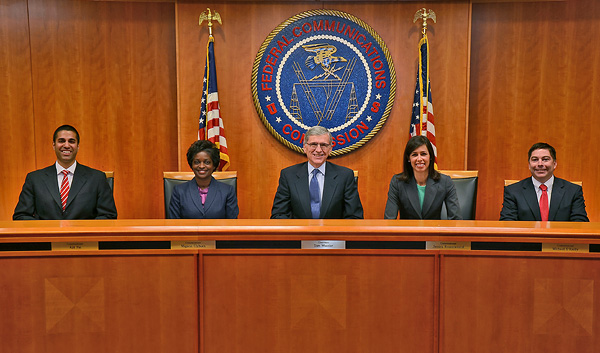Rules Of The Internet Now Complete In A Convenient 583-Page PDF
Get Tom's Hardware's best news and in-depth reviews, straight to your inbox.
You are now subscribed
Your newsletter sign-up was successful
Following the FCC open meeting held February 26, in which a vote passed the rules to the open Internet, the FCC has been busy detailing these rules and preparing for its new responsibilities in managing the Internet. You can now read them in a 583 page PDF submitted by the FCC, but we will highlight the key points here.
Rule #1: No Blocking!
The first rule listed sets forth a complete ban on ISPs' ability to block lawful content. Unless the content you are trying to view is illegal, ISPs have no right to prevent you from viewing any website or using any service on the Internet.
Although this sounds like something that should go without saying, there are cases of ISPs blocking Internet content just because they do not agree with it. The most prominent case is when Verizon blocked access to NARAL, a pro-choice organization.
Not only did this violate NARAL's freedom of speech, but it also prevented users from viewing content they have a right to see. As the FCC said in the document, "Consumers who subscribe to a retail broadband Internet access service must get what they have paid for—access to all (lawful) destinations on the Internet."
Rule #2 & #3: No Throttling & No Paid Prioritization
To prevent websites from simply throttling access to sites it didn't approve of, or Internet services such as Netflix that require greater than average bandwidth, it was necessary for the FCC to impose a ban on throttling.
In response to services like Netflix, ISPs have been throttling speeds unless the provider of that service agreed to pay for a "fast lane." This lead to the third rule, which bans prioritizing some content over others. This helps to guarantee that users will have access to content they have paid for, but it also helps protect content providers from unfair charges. It also ensures a level playing field for smaller start-up content providers trying to compete against giants such as Netflix and YouTube.
Enhanced Transparency and Enforcement
In addition to the rules of the Internet, the FCC set forth some obligations that ISPs have to their customers. The goal here is to increase the transparency, so end users are better informed about the actions of ISPs and what happens to their personal data transmitted through the Internet. ISPs cannot sign a contract to provide unlimited Internet service and later limit your usage of that service.
Get Tom's Hardware's best news and in-depth reviews, straight to your inbox.
In Section 222, the FCC focused on the privacy rights of end users. Unfortunately, while there had been plans to impose strict regulations on how data is collected from users and what can be done with that data, the FCC has backed down on those plans.
Although the FCC stated that it has implemented some changes, classifying user data under Customer Proprietary Network Information (CPNI), a protected category of information, and imposing restrictions on ISPs' ability to use, disclose and access data without user consent, the changes to user privacy remain limited. The FCC stated that placing too many restrictions could hamper the growth and development of broadband networks.
To ensure that these regulations are followed, the FCC has the power to investigate ISPs at its own discretion.
Follow us @tomshardware, on Facebook and on Google+.
-
FinneousPJ Rule #1 is stupid and trivial. If you outlaw independent news services, it's okay to ban them? Dictators say cheers.Reply -
Urzu1000 Could we get a list of more points? These are pretty basic. I'm interested in how this will affect competition.Reply
(At work, I'll be reading the PDF later.) -
ataranlen Clearly, someone didn't even proof-read this. It is a 400 page PDF, with 583 paragraphs.Reply -
Christopher1 ReplyRule #1 is stupid and trivial. If you outlaw independent news services, it's okay to ban them? Dictators say cheers.
Rule #1 is exceedingly smart and takes care of something that was already happening.
They are not going to 'ban independent news services', it would not stand up under our Constitution and they would be spanked by the Supreme Court if they even tried.
Just another bunch of hyperbole from an extreme conservative. -
Christopher1 ReplyCould we get a list of more points? These are pretty basic. I'm interested in how this will affect competition.
They have already said that the new rules would not have much of an effect on competition. The only thing that would do that is linesharing which the FCC has said that they are not going to put into place. -
Osmin Now I am going to wait for some consumer friendly news outlet to digest the 500+ rules to give an opinion on the overall effect. I would definitely fall asleep reading it and would miss important legal terminology. I would like to know if there are loop holes or what they will claim to be an oversight. Legal experts will be all over this to find a loop hole in order to take advantage of it. Just hope the consumer wins in the end and hope this was not just to calm down the people that were getting tired of the poor internet speeds at high prices. If they don't make the ISP upgrade their infrastructure to support the speeds they promise you, then it will not change things until your local city provides ISP services.Reply -
sewcrates This only applies to the United States, so theoretically, dictatorial control isn't an issue.Reply
